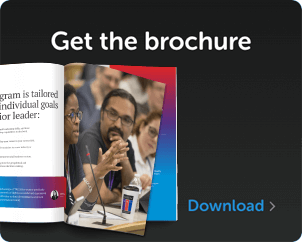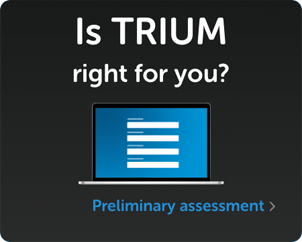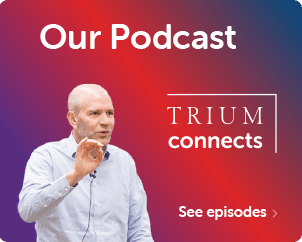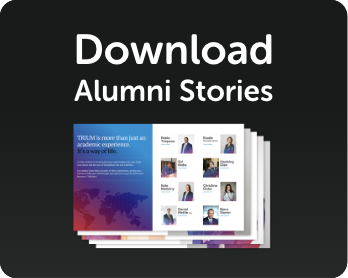
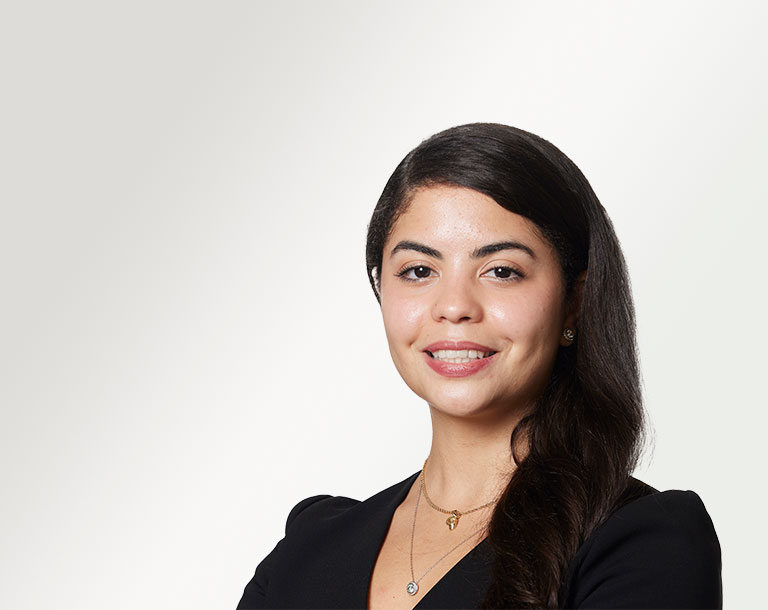
Sarah Lamarche
Sarah Lamarche (Class of 2024)
Senior Manager, EY
“I carry with me not just a diploma and the TRIUM family, but a deeper understanding of the world of business, macroeconomic and geopolitical trends— and most importantly a new-found sense of purpose and commitment to drive positive change in the world.”
As a Consulting Leader, Sarah Lamarche helps her clients—financial services institutions and top global banks—transform their businesses and manage risks that arise from the shifting geopolitical and economic environment, changing customer demand, competitive landscape, emerging regulation, and disruptive technologies.
As she approached an important career milestone in the aftermath of the pandemic, she reflected on her personal career experience as well as the evolution of the industry over the past decade. She realized that while the industry had experienced significant advancement and innovation, many aspects still needed to evolve in order to make it more fair, accessible, global, and seamless—and that she wanted to be a part of that evolution.
“I was looking to expand my horizon, broaden my perspectives, and sharpen my skillset while becoming a more holistic global leader. I wanted to bolster my level of influence and impact as I help shape the Banking Industry of tomorrow,” she said. “TRIUM was the perfect program for me, not only because of the three world-leading partner universities, the visionary faculty who designed the program— or the diverse and significantly experienced executive cohort, but also because of its innovative approach. TRIUM’s learning model is specifically curated for global leaders who are seeking to make an impact in the world, beyond their specific business or industries. This to me was refreshing, inspirational, and invaluable.”
Sarah recently spoke with TRIUM about how the program has sharpened her skillset and widened her perspectives, why she is passionate about DEI, her advice to younger women in the industry, and how TRIUM will help her become a leader of the future.
How did TRIUM’s modules on technology and innovation inform your perspective and career path in the Financial Services sector?
Consultants are often brought in to provide advice and help solve clients most pressing issues, whether this entails advising on the development of a new product or service, enhancing an existing process, addressing risk and control gaps, or responding to regulatory matters.
The technology and innovation modules complemented my technical toolkit and perspectives and in fact, I am already applying the concepts (i.e., Fintech, Artificial Intelligence (AI), Gen.AI, Machine Learning, Data and Analytics) with my teams to develop novel approaches as we address the industry challenges more comprehensively, at larger scale and with more speed.
However, the Leadership and Change Management course resonated deeply with me. And that is because regardless of our area of expertise and industries, we all deal with change, and we all deal with other people. The course taught us about the psychology of change, the power of influence, how response to change is influenced by culture, generation, among other factors.
In my opinion, there is a lot of technical expertise, deep content, and subject matter across the industry; but what truly differentiates good leaders from transformational and transcending leaders is the ability to cut across domains, stitch pieces of information from multiple parts of an organization, connect the dots and the minds and hearts of people to successfully orchestrate change and manage transformation. This is particularly important during today’s unpredictable and uncertain times. TRIUM gives you the skills and holistic leadership mindset to do just this.
What challenges do women face in a traditionally male-dominated field? If you could give advice to younger women interested in following a similar career path, what would you say?
There are many challenges individuals, including women face in the financial sector, but also across many other industries—from conscious or unconscious bias, discrimination, to lack of representation in leadership positions, pay gaps, etc. However, the good news is that where there is a gap there is an opportunity to change things for the better. Studies show that progress has been made, we are moving the needle, we just need to move it faster!
In terms of advice to younger women, I can offer tips I have implemented myself as I have progressed my career:
Prepare, practice, train and persist. Don’t wait for the spotlight or opportunity to find you, but search for it, trust your abilities and shine. No one can take away your ideas, arguments, thoughts, and knowledge; therefore, you should not be afraid to speak up and project these with confidence and boldness. When you encounter roadblocks, know that you are not alone. Look for coaches, mentors, and sponsors both within and outside your firms. They say it takes a village and we are all in this together!
You are a passionate advocate of diversity, inclusion, and equity. What drives your passion for DEI and what progress have you seen in the past few years in this arena? What are areas for growth in the financial sector?
What fuels my passion is learning and understanding other cultures, creating connections, and giving back to those groups who historically have faced challenges. I want to make sure I leverage my network and trajectory to provide a platform to amplify the voices across these groups. I believe that everyone’s ideas are valuable and important.
I am passionate about DEI not only because it fosters richer insights, innovation, and creativity, but also boosts decision making, morale, and employee satisfaction. In addition, studies indicate that DEI allows businesses to reach more communities, which results in business expansion and better business, products, services.
I have seen progress in the sector – over the last decade many firms have formally established Employee Resource Groups (ERGs) or affinity groups focused on the topic. These groups are responsible for setting strategies for hiring, retaining, and developing diverse individuals, among other responsibilities. The conversation is now oriented toward shifting the balance of power and promoting these diverse individuals to Senior Leadership positions.
Speaking of diversity, how did you find the diversity of the TRIUM cohort?
TRIUM is the definition of diversity in every sense of the word! Both the cohort and faculty were tremendously diverse in terms of nationalities, professional backgrounds, generations, etc. The program celebrated diversity in all its forms, and we made sure to foster an inclusive learning environment where every voice was respected, valued, and heard within and outside of the classroom.
What return on investment has the program given you, or how do you anticipate it will in the future?
In my opinion the return on investment transcends metrics and any words I can put on a page. Beyond career advancement, professional development and the knowledge gained, we all built a network of friends, connections, and memories that will last a lifetime. The experience was truly transformational and challenged me to re-evaluate my assumptions.
I carry with me not just a diploma and the TRIUM family, but a deeper understanding of the world of business, macroeconomic and geopolitical trends— and most importantly a new-found sense of purpose and commitment to drive positive change in the world.
As you’ve said, you’d like to shape the Banking Industry of tomorrow. How will TRIUM help you do that?
I consider myself a change agent. I would like to continue to work with my clients, teams, classmates, and faculty to challenge the status quo and conventional ways of solving business problems.
I want to drive and affect meaningful transformation not only within the banking industry, but also across the world of business. My vision of such transformation is one in which businesses can function in harmony, creating sustainable and long-term value, increasing profitability— while also managing risk and strengthening environmental, social, and corporate resiliency.
TRIUM has broadened my perspectives and the way in which I see the world. It has rounded my business acumen and provided me the platform and foundation I need to navigate the complexities of our interconnected world. I can’t wait to reshape current business models and foster a more ethical, sustainable, and inclusive approach to business.
How would you describe your TRIUM experience in three words?
Transcendent. Magical. Sublime.

